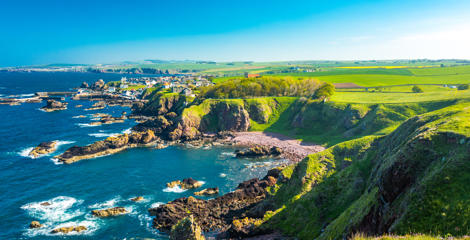Tackling plastic pollution: the Plastic Hunt initiative in North Vietnam
Building community engagement to tackle the impacts of plastic pollution: the Plastic Hunt North Vietnam
Plastic pollution is a growing threat to marine environments across the globe. In Vietnam, rapid economic growth, urbanisation, and changing lifestyles have led to a country-wide plastic pollution crisis.
Heriot-Watt researchers are leading a large-scale project – Sources, Sinks, and Solutions for the Impact of Plastics on Coastal Communities in Vietnam (3SIP2C) supported by UKRI’s Natural Environment Research Council through its Global Challenges Research Fund – which seeks to quantify the problem of plastic pollution in coastal waters and evaluate the mitigation measures that are most effective in order to develop solutions to the problem.
A key part of the 3SIP2C project is its Community Engagement and Capacity Building programme, which works with coastal communities, businesses, education and the public sector. Initial observations from this programme highlighted that many people in Vietnam society have limited understanding that plastic is problematic, either for the environment or themselves.
The Plastic Hunt: implementing a series of innovative engagement events
To tackle the problem of low understanding and engagement, the Heriot-Watt team created the Plastic Hunt. A series of innovative events to engage diverse stakeholders locally, regionally and nationally, it involved school pupils, students, fishermen and aquaculture farmers, tourism providers, governmental organisations and local communities.
The Hunt events took place across Cat Ba Island – the biggest of the 367 islands that form the Cat Ba archipelago in the world-famous Halong Bay – and proved to be highly effective. Using different engagement and communication techniques, and new insights from the wider 3SIP2C research, the events informed and inspired participants while exploring opinions and suggestions to identify ways to solve the plastic challenge.
Utilising citizen science and gamification to achieve impactful participation
The beach clean-up
An extensive beach clean-up and waste audit at Giao Ha involved 450 participants from schools, governmental organisations, and local communities. Seventy BSc undergraduate students followed scientific methodology to conduct the waste audit, while 220 BA students created media content (podcasts, radio programmes and TikTok posts) highlighting the impacts of plastics on the environment and local economies. Post-event analysis revealed 90% of the students reported increased knowledge and understanding of marine plastics and 80% reported being motivated to reduce their plastic use and to spread awareness on social media. The event also inspired collaboration between Giao Thuy National Park and local residents to keep cleaning and monitoring the beach.
3D map modelling and ‘Plastics Journey’ storytelling
A student focused 3D map modelling project trained over 30 high school and 10 BSc students to produce accurate 3D models of Ca Ba Island through which they learned about the island’s geography, ecology, and economic composition. The complementary ‘Plastics Journey’ storytelling workshop built their learning further. Feedback indicated that more than 70% of the participants felt motivated to engage friends and relatives on the issue of plastics, while 90% were inspired to spread awareness on social media.
Participatory 3D mapping event
The participatory 3D mapping event with Cat Ba communities saw more than 30 stakeholders from six villages working together with researchers and students to visualise sources, flows and sinks of plastics on Ca Ba Island. This enabled knowledge exchange that enhanced both students and local communities understanding of the impact of plastics on their lives and local environment and stimulated identification of opportunities to work together towards mitigating plastic pollution. After digitising the data, the model was gifted to the Ca Ba National Park, which receives around 350,000 visitors a year, and hosts an exhibition of the project.
The Coconut hunt
A partnership with four tourism providers and the Ca Ba Fisheries Cooperative, the Coconut hunt looked to involve the island’s residents and visitors. Fifty pupils from three primary and secondary schools painted coconuts which were released into Lan Ha bay, with residents and visitors invited to search for them. The hunt reached over 3,400 people on Facebook and was covered by the largest environmental media outlet. Teacher feedback indicated that conversations about plastic reduction, reuse, and recycling, had occurred not only at school but within the homes of the participants as well. 22% of the coconuts were found and recorded, helping to evaluate the accuracy of the researchers’ oceanographic model, as well as inspire action through playful citizen science.
Contact
Policy, Strategy and Impact (PSI)
- PSI@hw.ac.uk
Related content

The Lyell Centre
A world-class institute at the forefront of geosciences and marine research, addressing global challenges in climate change, energy, and environmental sustainability.